Your Complete Guide to Car Deposits
February 13, 2024
I am a serial entrepreneur and a consumer advocate. When I’m not helping car buyers, I love working on ventures that have a positive impact. I run a cause marketing agency and serve on the board of Vayu Global Health where we are disrupting the medical industry and preventing the needless deaths of mothers and babies during childbirth.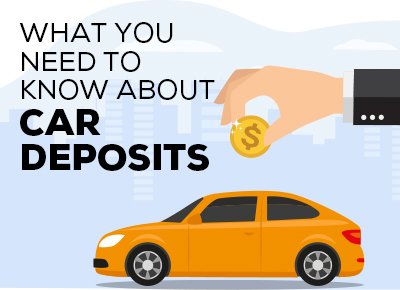

A car deposit can save you money on monthly payments, but at the same time, they carry some amount of risk. There could be instances where the dealership won't refund the deposit.
Here's everything you need to know about car deposits.
Key Takeaways
- There are holding deposits (refundable or non-refundable) to reserve a car and purchase deposits, typically non-refundable, for cars not in stock or special orders.
- Deposits can be refundable (under certain conditions) or non-refundable if you change your mind.
- When leaving a deposit, ensure terms are in writing, research the dealer, check the VIN, pay with a credit card for disputes, and only leave a small deposit.
- If refused a refund on a deposit, review your agreement, formally request the refund, and consider legal advice or filing a complaint if necessary.
Table of Contents
- Key Takeaways
- What You Need to Know About Car Deposits Video
- Do I Need to Leave a Deposit?
- Types of Car Deposits
- Refundable vs. Non-Refundable Car Deposits
- Should I Leave a Deposit For a Car?
- How to Protect Yourself When Leaving a Deposit
- What to Do If the Dealer Won't Return Your Deposit
- What Are My Car Deposit Refund Rights?
- Putting Down a Deposit with a Car Dealer: Conclusion
- Best Car Deals by Category
- Frequently Asked Questions
- Direct Access to Auto Experts
(phone, chat, or email) - Unlimited Access to Car Buying & Negotiation Tools
(market price reports, trade in valuation) - Get 20% Off
Enter SAVE20 at checkout
What You Need to Know About Car Deposits Video
Do I Need to Leave a Deposit?
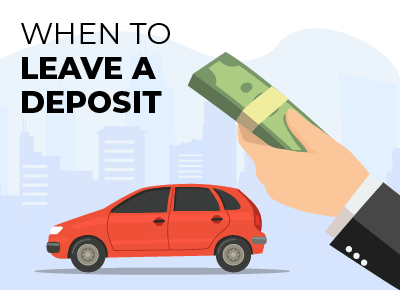 Some car dealers may request you put down a deposit, but you are not required to.
Some car dealers may request you put down a deposit, but you are not required to.
You can always decline to leave a deposit if you are not comfortable with it.
People are most likely to leave deposits in these cases:
- Dealer Trade. The dealer does not have the car you want in stock but is willing to trade with another dealer to get it for you.
- Special Order. The dealer special orders the car from the factory for you.
- Hold Vehicle. To hold a vehicle for a certain time after the price negotiation.
Types of Car Deposits
You can make two types of deposits when buying a car: a holding deposit or a purchase deposit.
Holding Deposit
The holding deposit reserves the car for you, preventing the dealer from selling it to someone else. It's the most common deposit for used cars.
The holding deposit CAN go toward the purchase price, but this must be negotiated with the dealer. The holding deposit is only valid for a certain amount of time. Holding deposits can be either refundable or non-refundable.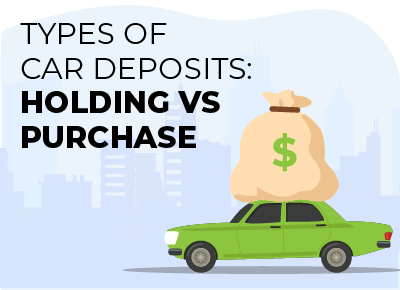
Purchase Deposit
A purchase deposit is often used when the dealer does not have the car you want in stock but has located it.
Most new cars bought from the factory require this, but some used car dealers will also ask for a purchase deposit when trading with or buying from another dealer.
Typically, the purchase deposit is non-refundable, but you may be able to negotiate otherwise with the seller. You should carefully review the contract with all of the terms and conditions of the sale.
Refundable vs. Non-Refundable Car Deposits
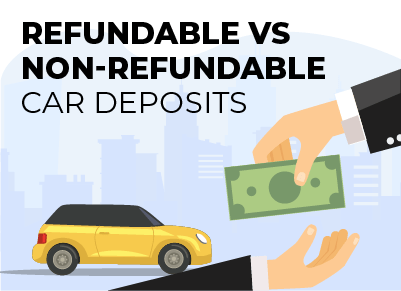 Deposits can be refundable or non-refundable depending on the contract you sign.
Deposits can be refundable or non-refundable depending on the contract you sign.
If the deposit is refundable, you will get your money back if you choose not to purchase the car. However, even refundable deposits could have conditions. Ideally, you want a deposit that is unconditionally refundable and in writing.
Some dealers may only agree to a conditionally refundable deposit, so ensure that you fully understand and agree to the conditions. If you back out of the deal for any reason outside of the agreed-upon conditions, you will not get your money back.
Non-refundable deposits (sometimes marked as a deposit listed under "partial payment") will not allow you to get your money back if you change your mind. The only way to get your money back from a non-refundable deposit is if the dealership dishonored contractual/ legal obligations.
Examples of When a Car Dealer Will Refund Your Deposit
Regardless of which type of deposit you left, the dealership may refund it if:
- The dealer cancels the order (for example, if the factory cannot supply the car)
- Finance application is declined (not required, but most dealerships refund)
Should I Leave a Deposit For a Car?
Leaving a deposit carries a risk of a major loss, but sometimes it can be to your benefit to reserve the vehicle. For a deposit to be a good idea, you must be very certain you are ready to buy the car.
If you have a clear contract in hand for a refundable deposit and can negotiate the deposit down to a very low amount, it can be a good idea for cars on the dealer lot. It's worth noting that a down payment is different from a deposit.
How to Protect Yourself When Leaving a Deposit
If you do leave a deposit, make sure to protect yourself with these tips:
- Get the Terms in Writing. Make sure all terms of the deposit are clear and signed by both parties. Review the vehicle purchase agreement to make sure all the information matches.
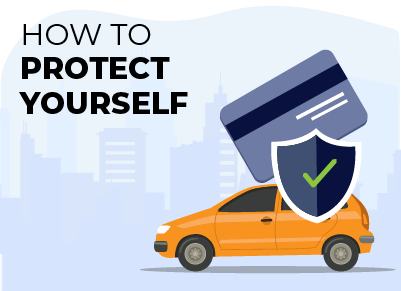
- Research the Dealer. Find out about the dealership's reputation and steer clear of any that have abundant complaints about deposits, service, trustworthiness, etc.
- Check the VIN. Only leave a deposit if you know for certain the dealer has access to it. Check the vehicle's VIN to determine its history including accidents, liens, if it was stolen, etc.
- Be Ready to Purchase. Only consider a deposit if you are sure you are ready to purchase the car.
- Lookup Your State's Laws. Some states have laws that allow you to get your deposit back.
- Inspect the Car. Even if you have a refundable deposit, you should inspect the car before placing a deposit to avoid later stress and hassle.
- Pay With a Credit Card. Never pay a deposit in cash because it will be much harder to dispute and get back if something goes wrong.
- Get a Deposit Receipt. A deposit receipt is crucial for your own records and will be essential if there's any disagreement later on.
- Negotiate a Small Deposit. Do not leave a large deposit, as there's a chance you won't get the money back. Negotiate as low of a deposit as possible to protect yourself.
What to Do If the Dealer Won't Return Your Deposit
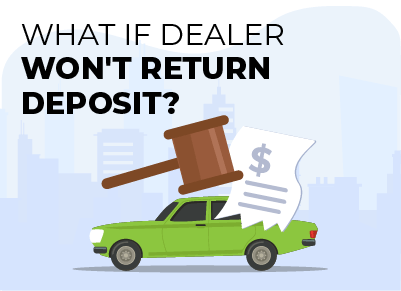 Unfortunately, some dealers will try to keep your money even if you meet the agreed-up conditions for a refund.
Unfortunately, some dealers will try to keep your money even if you meet the agreed-up conditions for a refund.
Here is a step-by-step guide of what to do if the dealer won't return your deposit:
- Before pursuing any action, review the terms and make sure you are actually entitled to receive a refund.
- If you are, then start by requesting your deposit back in a letter.
- If no action is taken, state that you will file a complaint with Better Business Burea, and then do so if you still don't hear back.
- Finally, you may consult a lawyer or take the matter to the small claims court.
The bottom line is that deposits can help you get the car you want, but they carry some risk. Ensure you know the terms of the deposit, have them in writing, and only consider a deposit if you are committed to buying the vehicle.
What Are My Car Deposit Refund Rights?
When it comes to car deposit refund rights, it comes down to the terms set in the contract. If you change your mind about purchasing a car and request a refund before signing any contracts, you are entitled to a full refund of your deposit. However, once you sign a purchase agreement or contract, the refund terms may vary.
To protect your rights, thoroughly read and understand the refund policy before making a car deposit. If you have concerns or encounter issues regarding your deposit refund, communicate directly with the dealership or seek legal advice if necessary.
Putting Down a Deposit with a Car Dealer: Conclusion
The world of car deposits can seem like a maze, but it's all about knowing the shortcuts. Whether it's choosing between holding or purchase deposits, figuring out if your deposit is refundable, or ensuring you're covered in any scenario, the key is in the details.
Always get everything written out clearly, do a little detective work on your dealer, and think twice about how you pay.
We've got your back with the next steps. Dive deeper into the car buying journey with us—your go-to for making informed decisions.
Best Car Deals by Category
Frequently Asked Questions
What is a deposit for a car?
The deposit is simply meant to reserve the car so that the dealer won't sell it. You can (and should) negotiate for the deposit to go toward the car purchase.
Do I need to leave a car deposit?
No, you do not have to leave a car deposit, even if the dealer requests it. They are more likely to request a deposit if the dealer is trading with another dealer for the car, it's a special order from the factory, or if the vehicle needs to be held at the lot after price negotiations.
When is it a good idea to leave a deposit?
Leaving a deposit with a dealer may be a good idea if you are very certain you are ready to buy the car. If you have a clear contract in hand for a refundable deposit and can negotiate the deposit down to a very low amount, it can be a good idea for cars on the dealer lot.
How can I protect myself when leaving a deposit?
Get the terms in writing, look up state laws, pay with a credit card, get a deposit receipt, and only leave a small deposit.
What's the difference between a down payment and a deposit?
The down payment is when you pay for part of your new vehicle upfront and then finance the rest. The deposit holds your purchase until you can buy it. If you negotiate this with the dealer, the deposit may go toward your down payment.
Is a deposit refundable?
Car deposits can be refundable, but they are not always. Carefully check the terms and conditions of the deposit before agreeing so you know if (and under what conditions) it would be refundable.
Can I get my deposit back if I change my mind?
If you signed a refundable deposit and meet any conditions listed, then you may be able to get the deposit back.
Can I get a non-refundable deposit back?
Agreeing to a nonrefundable deposit is a huge risk, and most times you cannot get your money back. The only time you can get your deposit back is if the dealer misleads you or lies. You may need to file a claim with the BB and take the dealer to small claims court.
What should I do if the dealer refuses to return my refundable deposit?
Contact your credit card company if you paid via card and place a dispute. You should also review your state's consumer protection agency and file a report with the BBB. You may need to contact a lawyer for assistance.
Posted in Car Buying Tips |





